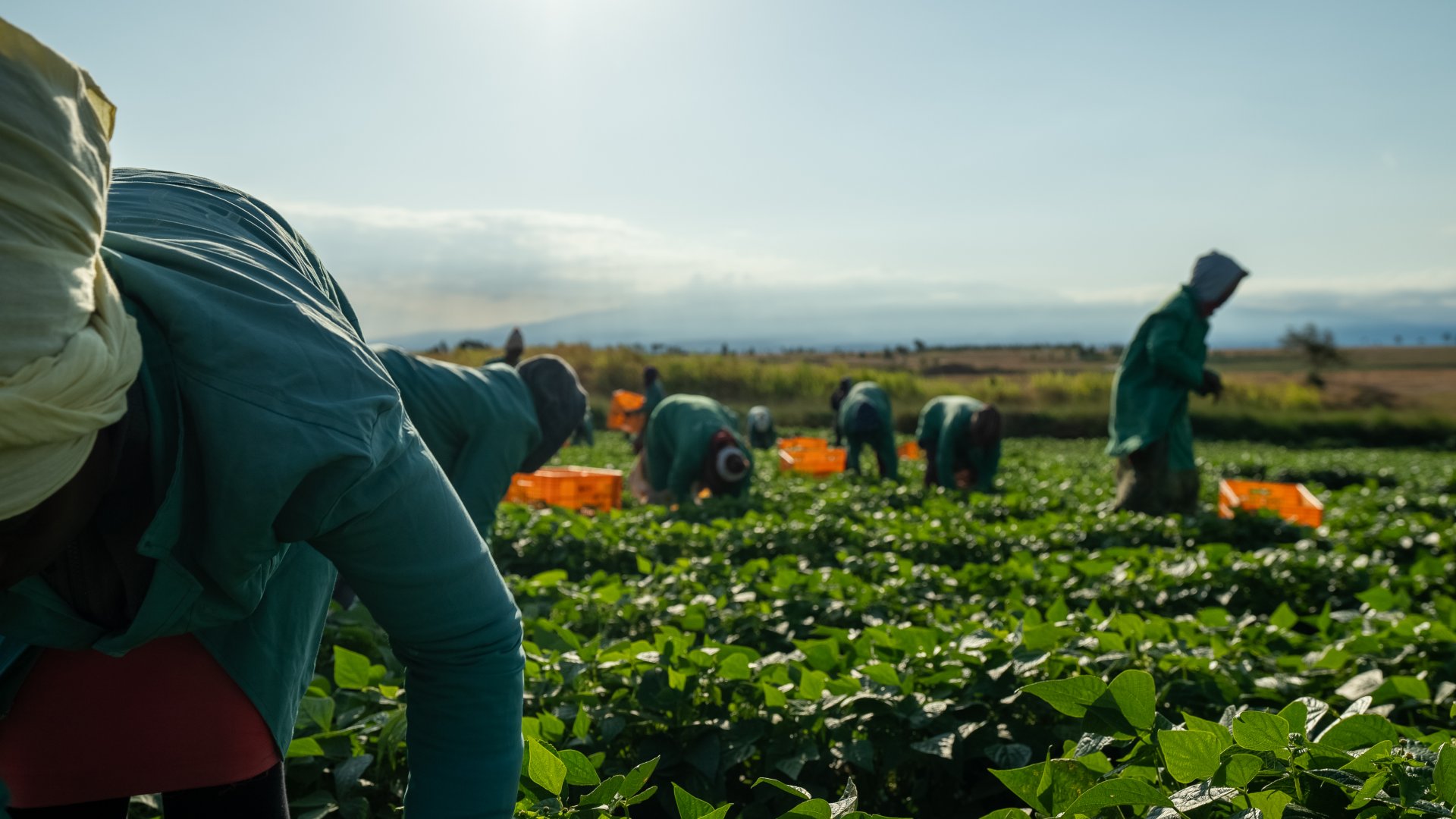Strengthening Adaptation through GESI
The Uneven Impacts of Climate Change
Around the world, the effects of climate change on people and ecosystems are unevenly distributed. Historically, the majority of global greenhouse emissions have originated from economic activities in the Global North. Today, however, it is the Global South that will bear the brunt of these effects, while often lacking the resources necessary to fund climate adaptation. To account for this, the DFCD is mandated to develop climate solutions in some of the world's most at-risk environments.
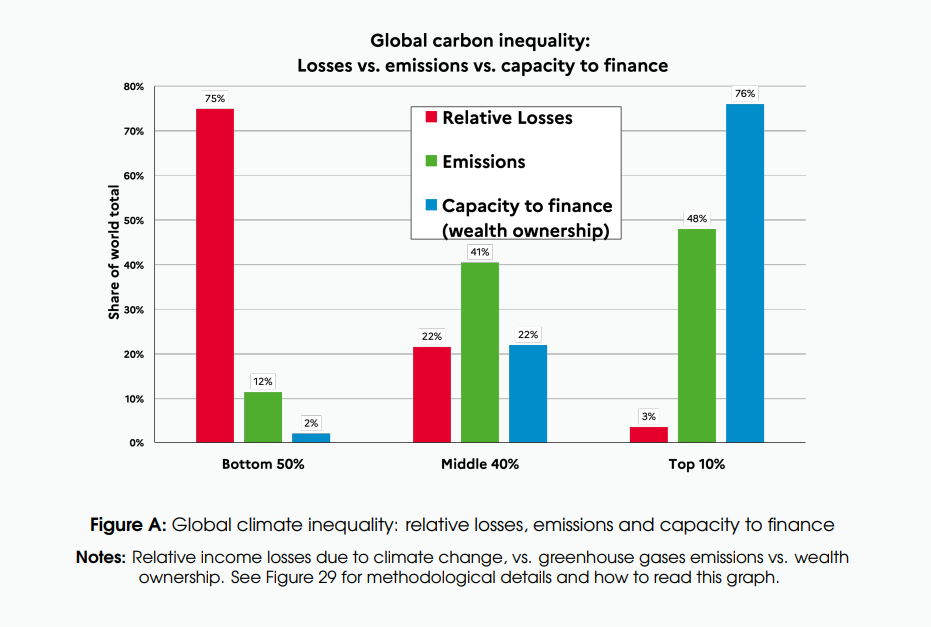 'Global Climate Inequality' - Climate Inequality Report 2023, World Inequality Lab Study.1
'Global Climate Inequality' - Climate Inequality Report 2023, World Inequality Lab Study.1
However, even within these settings, certain groups are more acutely exposed than others. “Vulnerability is exacerbated by inequity and marginalisation linked to gender, ethnicity, low income or combinations thereof, especially for many Indigenous Peoples and local communities,” according to the IPCC (Intergovernmental Panel on Climate Change) 2023 Climate Change report.2
Recognising these disparities, the DFCD has embraced the imperative of advancing Gender Equality and Social Inclusion (GESI) in its Origination Facility work. The objective of the projects that we support is to enhance the climate resilience of 16 million people's lives. A deeper embedding of GESI within our strategic approach presents the opportunity for this to include more marginalised groups, ensuring that we more effectively address the intersectional impacts of climate change.
Discrimination, powerlessness, exclusion, illiteracy, abuse, violence, and limited access to resources and services: these are all factors that increase exposure to the consequences of everyday risks (like food insecurity and lack of access to clean water), extensive risks (such as flash floods or droughts), and even intensive risks (such as tropical cyclones). This is specifically applicable to women and Indigenous groups, who are often more exposed to the factors above than other members of society.
Aside from being unjust, the effects of this skewed distribution of impacts can be dire for the broader population. This is because women and Indigenous peoples often act as important change agents - protecting the environment and promoting biodiversity through sustainable soil and water management, reforestation, and the preservation and cultivation of crop varieties. For example, small-scale farmers, the majority of whom are women, produce around one-third of the world's food.3 Indigenous Peoples, who make up roughly 5% of the world's population, protect around 80% of the earth's biodiversity.4
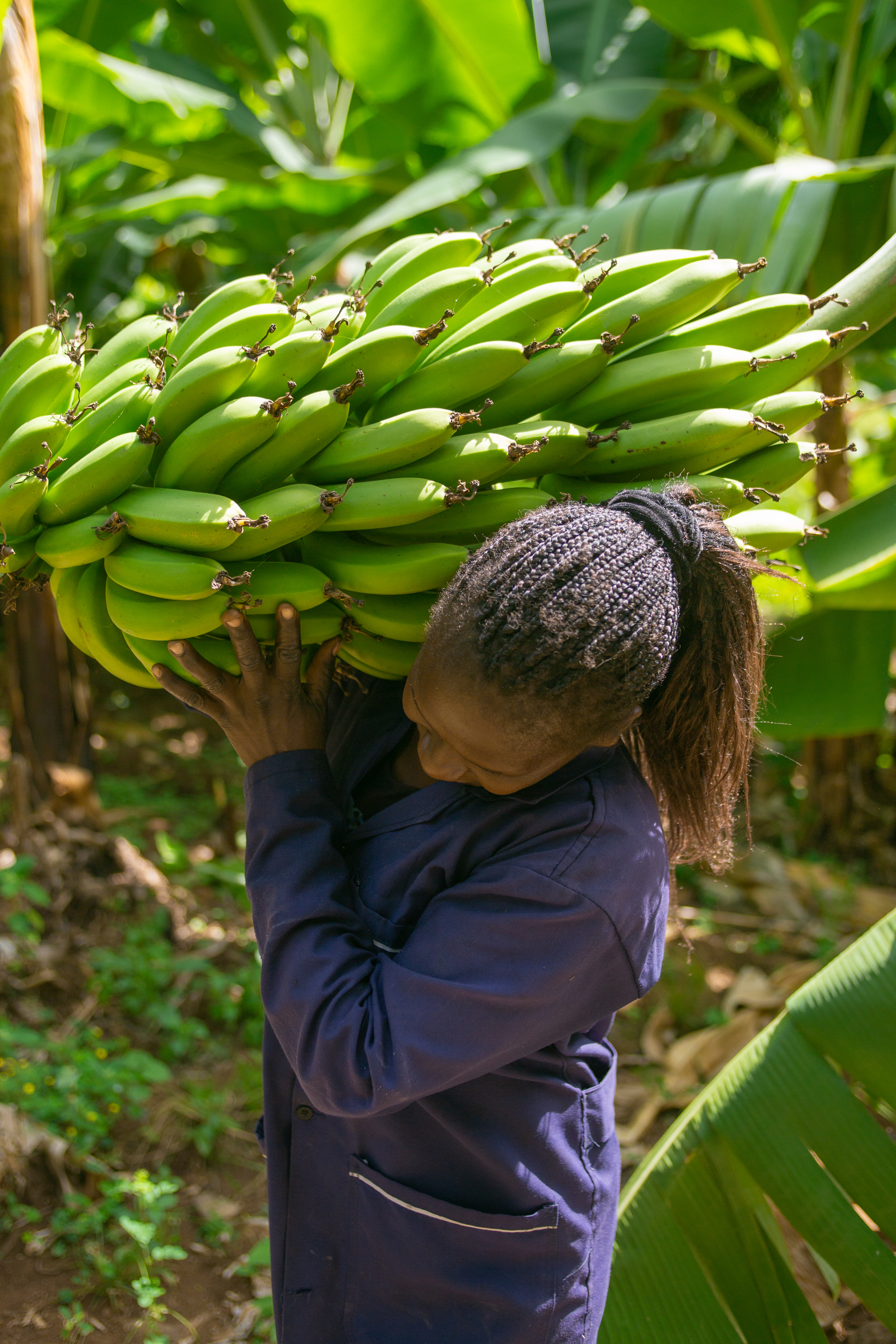
Banana farmer working with Sokofresh, an SNV-supported project in Kenya.
Moreover, these groups are susceptible not only to the direct risks of climate change, but also to the consequences of inadequately integrated climate responses. Maladaptation excludes vulnerable groups from decision making on climate responses, which can further impede access to resources and services that enable their full participation in sustainable economic development (e.g., energy, water, forestry, agriculture, and financial services).5
To account for these challenges, a strong foundation for our GESI approach was established in the first phase of the Origination Facility. Various projects carried out successful Environmental and Social activities, such as gender analyses across value chains and upgrading company policies, which highlighted opportunities for increased visibility and involvement of marginalised groups.
Transformative Projects on the Ground
Cinch, for example, is a WWF supported project in Kenya, which unlocks the value of unutilised land to ensure a reliable income for smallholder farmers, many of whom are women. As part of their workplan, Cinch conducted a human-centred gender needs assessment, surveying 112 landowners and workers. The assessment aimed to determine the extent to which the project met women’s specific needs, and proposed interventions that could benefit them. These recommendations included developing a savings program, sharing educational materials on wealth diversification, and enhancing communication opportunities with project owners, to improve the women’s experience and livelihoods.
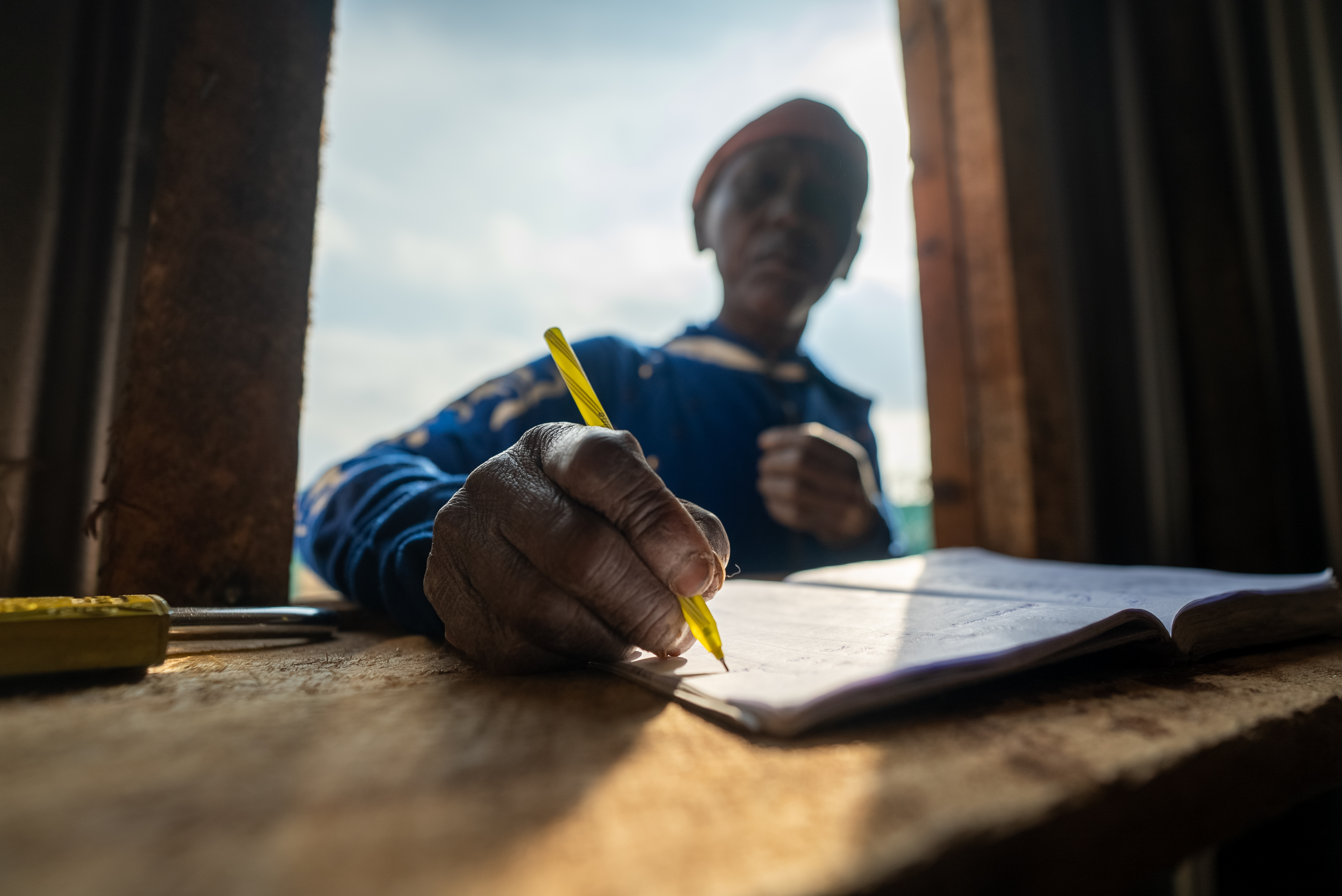
Farmer signing in at Cinch, a WWF-supported project in Kenya.
In Cambodia, Kofi, an SNV supported project, specialises in coffee bean roasting and wholesale. Kofi actively collaborates with local NGOs to provide internships and jobs to vulnerable urban populations. SNV facilitated engagements with Kofi, including GESI reflection workshops aimed at enhancing existing initiatives and strengthening diversity and inclusion efforts, with participation from company leadership and external consultants. These initiatives extend to planning a new rural processing facility with GESI considerations, focusing on empowering smallholder coffee producer cooperatives, and integrating GESI principles into broader company operations.
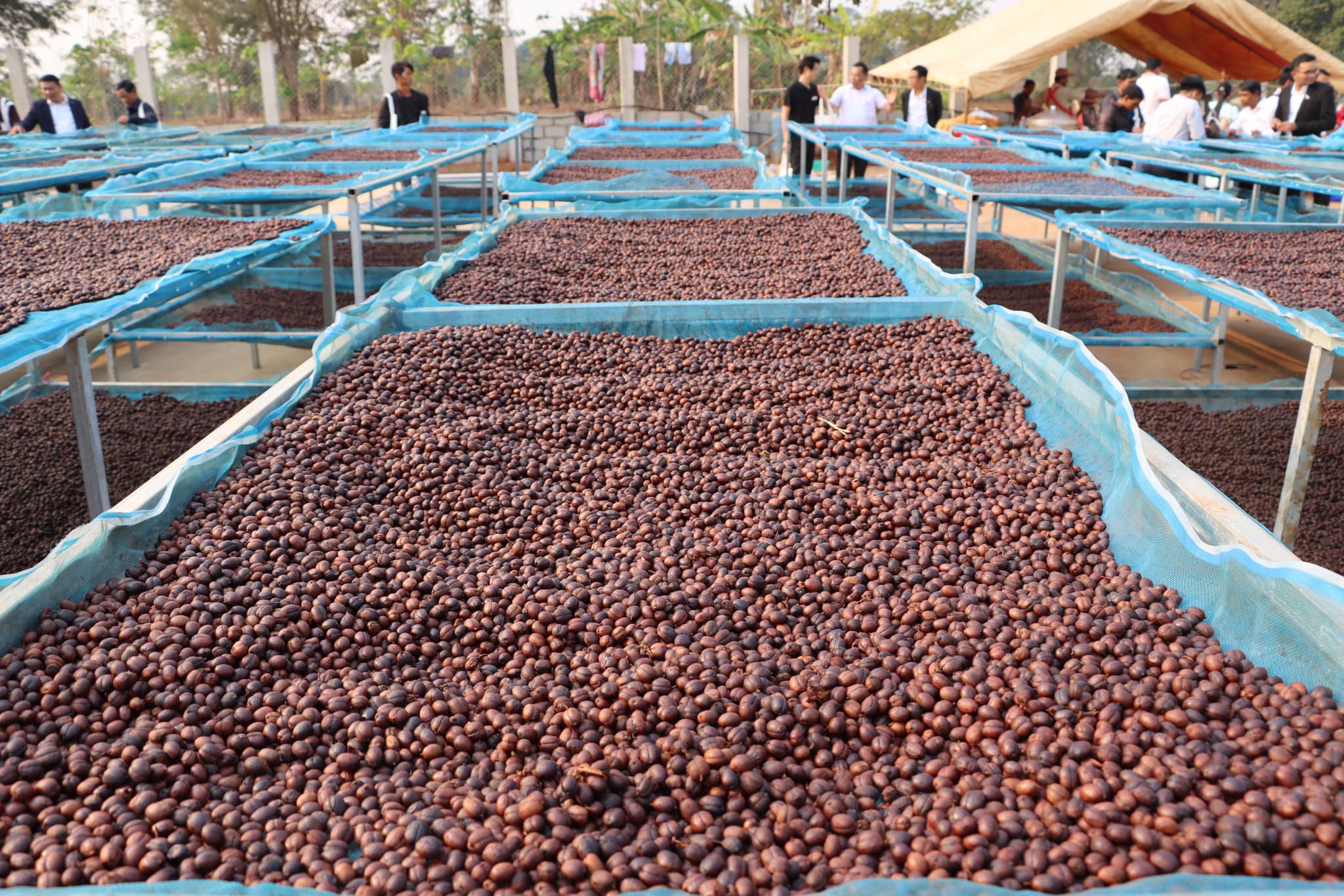
Coffee bean drying at Kofi, an SNV-supported project in Cambodia.
Incorporating these activities as part of the origination process, while the projects are increasing their capacity to receive investment, helps to ensure better practices become ingrained and are ready for expansion upon scaling up.
GESI as an Impact Focus Area
Moving forward, the Origination Facility will integrate GESI as an impact focus area. This means that all projects which we support will be able to carry out activities to mainstream GESI. To do this, we will be building specific GESI capacities across our Origination Facility teams. Due to the highly contextual nature of GESI-related issues, it is crucial that this is done at the local level, in our country offices. Trainings and workshops to share learnings and decide on necessary strategies, which began last year, will be replicated across all DFCD regions, ensuring our actions are tailored and responsive to the needs on the ground. This will enable implementing offices to better identify impacted communities and pursue opportunities for strengthening participation and leadership of marginalised groups for each project. In addition, we will leverage the experience of comparable approaches employed by Consortium partners in other development initiatives.
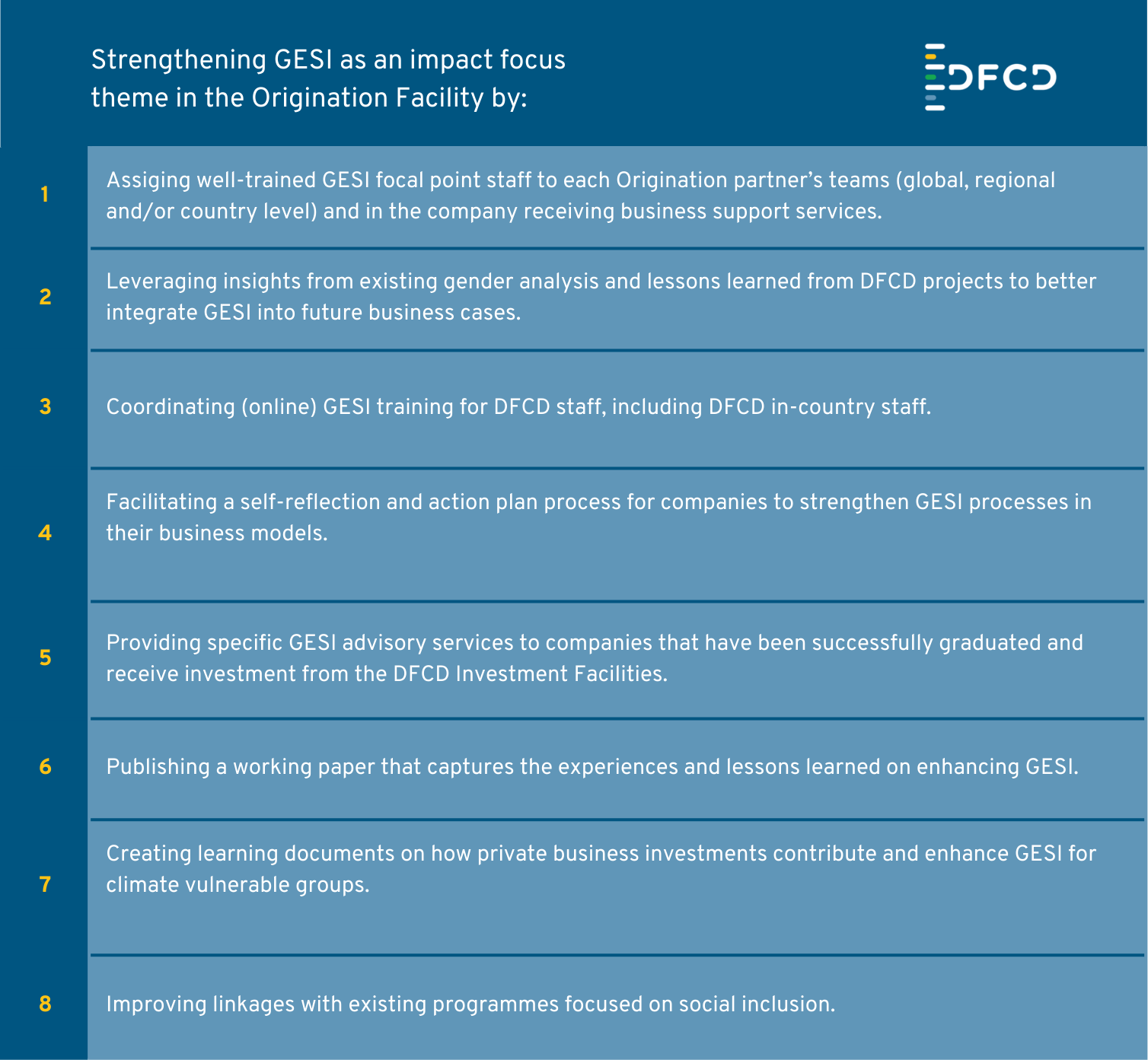
DFCD Origination Facility initiatives to strengthen GESI as an impact focus theme.
By embedding a GESI approach within our origination process, we can achieve lasting impact for climate vulnerable populations around the world while being more responsive to the aspirations of marginalised groups therein. We look forward to sharing more about this approach as it matures.
1. Chancel, L., Bothe, P., Voituriez, T. (2023) Climate Inequality Report 2023, World Inequality Lab Study 2023/8
2. https://www.ipcc.ch/report/ar6/syr/downloads/report/IPCC_AR6_SYR_LongerReport.pdf
IPCC, 2023: Sections. In: Climate Change 2023: Synthesis Report. Contribution of Working Groups I, II and III to the Sixth Assessment Report of the Intergovernmental Panel on Climate Change [Core Writing Team, H. Lee and J. Romero (eds.)]. IPCC, Geneva, Switzerland, pp.101
3. Laura Turquet, Constanza Tabbush, Silke Staab, Loui Williams and Brianna Howell. 2023. “Feminist Climate Justice: A Framework for Action”. Conceptual framework prepared for Progress of the World’s Women series. New York: UN-Women. Available at https://www.unwomen.org/sites/default/files/2023-12/Feminist-climate-justice-A-framework-for-action-en.pdf
4. UN Climate Change, 2022: Indigenous Peoples: Defending the Environment for All. In: IISD [UN Climate Change (ed.)]. IISD, Geneva, Switzerland. Available at: https://www.iisd.org/system/files/2022-04/still-one-earth-Indigenous-Peoples.pdf
5. Eriksen, S. et al., 2021: Adaptation interventions and their effect on vulnerability in developing countries: Help, hindrance or irrelevance? In: World Development [Eriksen, S. et al. (eds.)]. Elsevier, Amsterdam, Netherlands. Available at: https://www.sciencedirect.com/science/article/pii/S0305750X20305118?via%3Dihub

